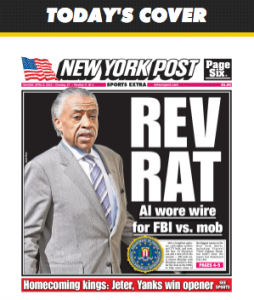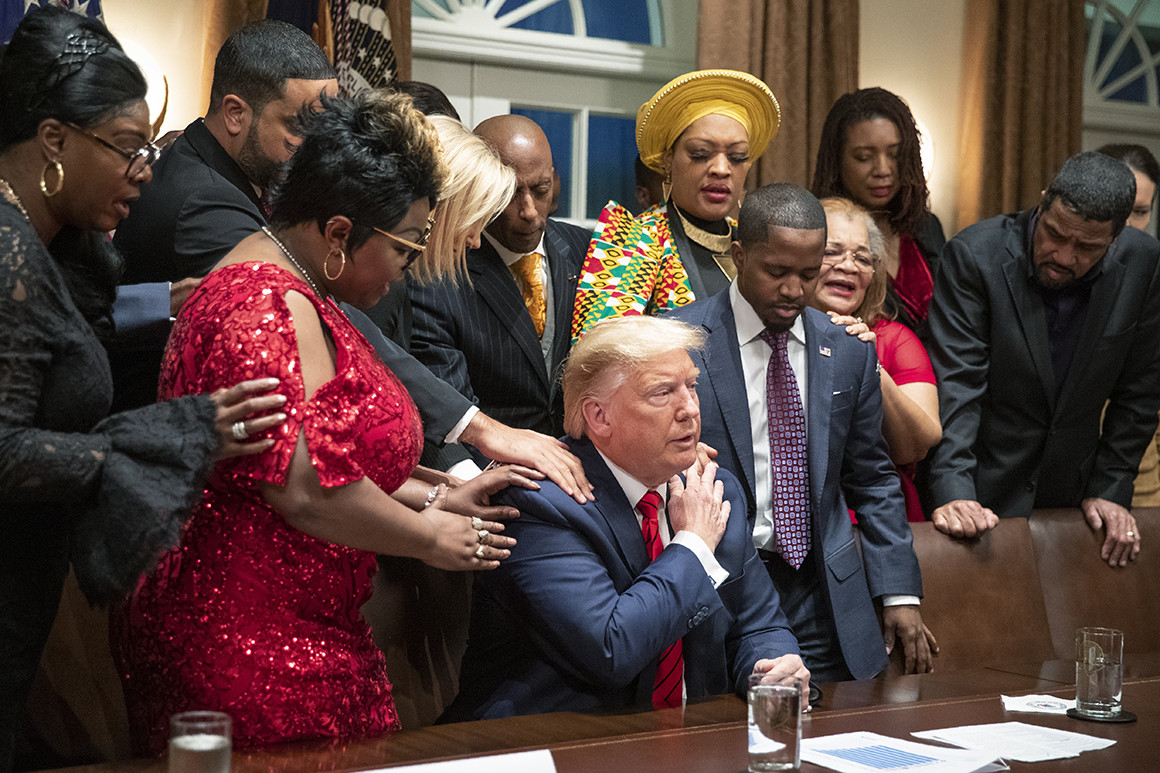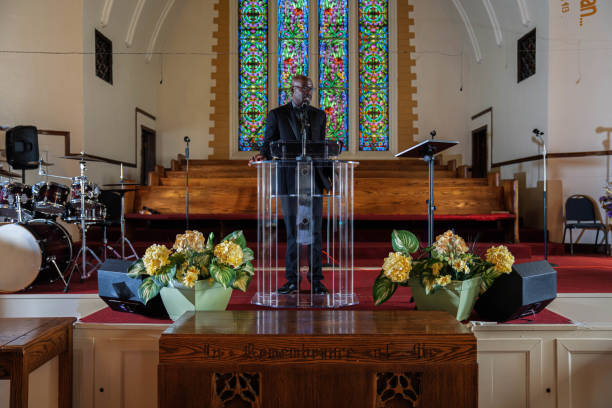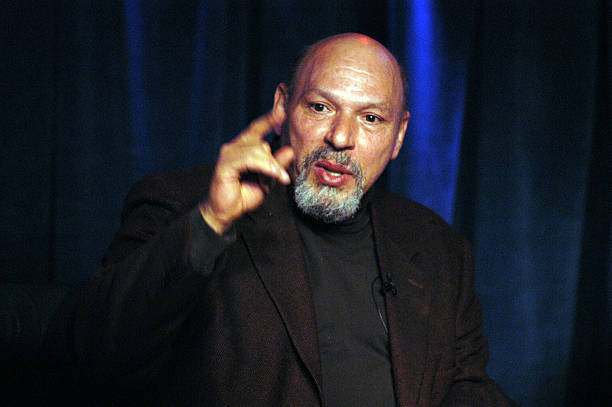(ThyBlackMan.com) I was admittedly not surprised to find out about the deep connections between Rev. Al Sharpton, the FBI and the mafia. I’ve read things, heard things and seen things that gave me an awkward feeling when I spent time with him in New York. At the same time, I’ve never been one to assume that an affiliation with the FBI or even the mafia necessarily means that you’re a bad person. I’ve seen former drug dealers do more for the black community than almost all of us, and I’ve seen federal officials who were every bit as corrupt and dirty as the worst criminals you could ever imagine.
But what most of us who care should probably realize is that, when it comes to understanding Al Sharpton’s role in the black community, you’re not going to get the truth from the powers-that-be. Political operatives have a keen interest in keeping Sharpton in power, and his enemies are seeking to smear him in any way they can.
The first thing I have to ask is that we stop believing that any African American being propped up by white (read: racially paternalistic) Democrats is automatically a black leader. Having a national television show does NOT make a individual the spokesperson for black people. In fact, the consistent psychological imperialization of black people has effectively made us into a community where our leaders are typically chosen by the descendants of our historical oppressors.
Secondly, we should let go of the antiquated idea that any black person being attacked by white people automatically needs to be protected. These sentiments are often used to control black thinking. By simply saying, “Those white folks are out to get me,” many of our leaders are able to effectively divert intelligent scrutiny from their own behavior by convincing you that you should rally behind them as a pathway to combating racism. All the while, you keep wondering why nothing is actually getting done, while your leaders are scaring you into showing up to vote for the Democrats.
combating racism. All the while, you keep wondering why nothing is actually getting done, while your leaders are scaring you into showing up to vote for the Democrats.
The bottom line is that any leader who makes you feel uncomfortable about asking difficult questions is not a leader at all. Instead, he might actually be your pimp.
With that being said, I thought about a few questions that every concerned African American should ask about Sharpton, so that we can best decide how to interpret his legacy:
1) Did you ever explain that incriminating video where you’re engaged in a drug deal? I noticed that when defending his mob affiliations, Sharpton never mentioned the video from 1983 showing him caught in the middle of a deal with a fake South African drug lord looking to move quite a few bricks of cocaine. The story being told in The Smoking Gun and other outlets is that it was this video, not a good conscience, which led Rev. Al to “see the light” and start working with the feds. A follow-up question would be: If Al had never been caught in the middle of a drug deal, would he have been equally anxious to work with federal agents? Notice that Rev. Sharpton and his representatives have failed to bring up this video in any of his public appeals to defend and/or explain his actions.
2) Why were members of the mafia so comfortable speaking openly about their criminal initiatives around you? In a recent appearance on the Arsenio Hall Show, Sharpton has made the argument that you can “only snitch on people you’re down with,” claiming that these members of the mafia were not his friends, but people who were threatening his life. However, it does appear that the Rev may have been mob connected. By “connected,” I mean being a person who can walk into the home of a mob boss and convince him to share incriminating information in your presence. Most of us don’t have that kind of access to mafia figures….they probably don’t talk openly about their business plans in front of enemies, victims or strangers.
3) Has there been a fundamental shift in the way that Sharpton does business since he was connected with the mafia? Al Sharpton’s book deal with Lil Wayne, his peddling of payday loans and many other questionable business practices over the years (including asking for a donation from Bill O’Reilly) are part of the reason that there is so much scrutiny of his behavior. My thought is that Sharpton is a man who does care for the black community, but he also cares a great deal about money and power, possibly at the expense of his own personal ethics. The black community doesn’t need a “boss,” seeking to make deals under the table and get into bed with any corporation, government entity or anyone who can pay the price of admission. I sometimes wonder if Sharpton is able to draw the line.
4) Did you snitch on any members of black leadership? Those accusing Sharpton of attempting to set up Assata Shakur deserve a response, especially in light of the fact that people are now fully aware of his long-term working relationship with the FBI. Once the feds have you in their grasp, they aren’t exactly open and willing to allow you to run out into the black community and start making trouble. There is a long history of prominent African Americans working with federal agents to undermine authentic leadership. If this is true, and there is evidence to support this assertion, it would be simply unforgiveable. It doesn’t mean Sharpton is necessarily a bad person, but sometimes, an otherwise good person can be coerced into doing bad things for the sake of self-preservation. If Rev. Sharpton knows anything, it’s how to survive under all circumstances: He’s a very tough and intelligent man.
5) Did your government history have anything to do with your problematically close relationship with the Obama Administration? During the 60 Minutes interview when Sharpton said that he would “never” criticize the president, he was effectively stating that his job was to protect the White House even in the face of policies that could be harmful to the black community. The idea that any civil rights leader would proclaim a commitment to open political puppetry is a danger to us all. That’s like President Obama saying that he would defend China as an unconditional ally, even if they were to attack American citizens.
I honestly wonder if someone has been holding a threat over Sharpton’s head all of these years, to the point that even if there were something wrong in the White House, he’d be afraid to speak on it. There is a big difference between SERVING black people and SELLING black people. The latter implies that you’ve used your influence and reach in the black community to create an economic reward for yourself that is predicated on your ability to manage black people and move them in the direction you need them to go, mainly to the polls every November. I’m not sure what kind of leader this gives us; it reminds me of Dr. Narcisse on the television show, “Boardwalk Empire.” Narcisse was also a self-proclaimed “black leader” who happened to deal drugs on the side and was forced to become an FBI informant after being caught in the middle of criminal activity.
So, without presuming that Sharpton is innocent or guilty in his work with both the regular mafia and the government mafia (the FBI has historically been worse than the mob in some cases), I would argue that intelligent Americans should ask a few more questions and find their own answers without all the political spin. What really concerns me is that the mere idea of encouraging people to find out the truth for themselves effectively makes me a threat to Sharpton and his friends. When the truth has become the enemy, then you know that someone is trying to do the thinking for you.
Perhaps Sharpton can clear this matter up with an objective journalist, asking hard questions, in a neutral environment, instead of simply doing interviews with his friends. His unwillingness to enter such a forum to defend his actions over the years may also serve as evidence that the truth has become his enemy.
Financial Juneteenth thoughts from this commentary:
1) America is a Capitalist Democracy, with capitalism often coming before Democracy. Basically, many of our leaders and politicians are driven by money. So, you can learn a great deal about the incentives of any public figure by asking, “Who’s paying their bills?” I don’t know every corporation or government organization that is giving Al Sharpton his money, but most of us can agree that he’s not being financially provided for by black people. This is going to impact his incentives when it comes to what he says and does, as it would with any other human being.
2) An individual connected to the Al Sharpton alleged drug deal caught on tape by the FBI says that Sharpton’s primary motivation for taking part in the deal was financial greed. A former FBI agent even told DNA Info that Sharpton was effectively “caught in a bear trap,” and was forced to cooperate with the feds.
I am not one to judge his desire to make money, since we all have a little bit of greed in our system. However, we must always remember that by allowing our greed to cause us to take money from anyone willing to provide it, we are effectively diluting the moral highground necessary to lead an impoverished community. But this idea can apply to the life of anyone: Never allow money to cause you to stray away from your core principles; you might get caught in an economic bear trap.
Staff Writer; Dr. Boyce Watkins
Dr. Boyce Watkins is the founder of the Your Black World Coalition. For more information, please visit http://BoyceWatkins.com.




















WE all know that the POTUS has a vetting process to protect him from unsavory characters that might latter prove embarrassing; so we would have to assume that OBAMA knew the information that was just recently exposed.
THE question we must ask ourselves is what makes AL so valuable to the POTUS or anyone else that utilizes his services.
AL was just recently asked this question and for once he was honest and he said he can deliver us!
THIS also speaks to the POTUS’S opinion of that he views just as the previous presidents have ; we’re just a people to be managed and manipulated but are interest is never taken serious or served or else why would he need AL.
http://www.foxnews.com/opinion/2014/04/16/why-does-al-sharpton-still-have-pull-with-america-political-class/
http://online.wsj.com/news/articles/SB10001424052748704588404575123404191464126
I have absolutely NO RESPECT for Al (or Jesse). Ever since I was younger, I couldn’t understand why adult black people supported his beliefs. I assumed since he was part of the civil rights era, black people felt he was on their side. Boy, were they wrong. Like other so-called leaders, Al is all about Al. Ut’s no surprise that he was involved with the mafia or drugs. If it involved him getting paid, Al would definitely be a part of it. No matter the color or nationality of the people. While he’s yelling racism and discrimination against blacks, Al’s making deals and shaking hands with them. Hypocrite.
Far as I’m concerned, Al hasn’t done anything for the black community except cause more hostilty and bitterness. I wonder if he’s still ripping off people at his church?
I said it before and I’ll say it again: There’s a picture of Al on thyblackman with his new young chick and Al looks like an old ass crackhead. He was on Wendy Williams and I thought he resembled a gay dude.